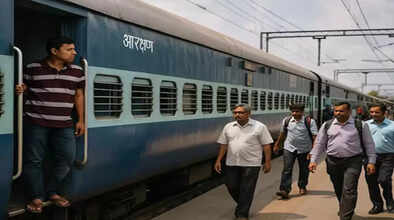Railways: A railway job doesn't mean 'free travel'; learn how the travel facility works for employees..

The common perception about railway employees is that they have complete freedom to travel without a ticket across the country. Seeing an employee travel easily on a train or seeing a ticket checker issue a pass immediately on the platform, people assume that a railway job means an "unlimited free travel pass." However, the truth is quite different.
Indian Railways does provide its employees with certain travel privileges, but these are limited and subject to strict rules. This means that no one is allowed to travel free on every train or in every class. This privilege is merely a privilege, subject to certain conditions.
Travel privileges for railway employees: A two-part system
The travel privileges available to railway employees are not an "open pass." They are divided into two parts: Privilege Pass and Privilege Ticket Order (PTO).
Privilege Pass
Many people mistake this for a free ticket, but it is only available a limited number of times a year. Employees are issued one set of passes for the first five years of service, and a maximum of three sets thereafter. One set represents the entire round-trip journey.
Privilege Ticket Order (PTO)
PTO is not completely free. Employees are required to pay only one-third of the ticket fare. This concession is available four times a year and can be used to travel at a discount.
Perks are determined by class and pay grade.
The class in which an employee can travel depends on their position and pay grade. Senior officers can travel in First AC, while Group C or D employees are limited to Sleeper or Third AC.
Even after receiving a pass or PTO, employees must book tickets. If a seat is unavailable, their ticket is put on the waiting list, and if it is not confirmed, they cannot board a reserved coach. This means there is no option to board the train directly by showing their ID card.
Which family members are eligible for the benefit?
This benefit is limited to the employee's spouse, children, and parents who are completely dependent on them. There is an age limit for sons, while there is no age limit for unmarried daughters.
Why is this benefit provided?
This tradition dates back to the British era. It was introduced to allow railway employees to stay connected with their families and explore different parts of the country. It is considered a non-monetary benefit, not a "license to travel without limits."
What happens after retirement?
Retired employees also continue to enjoy this benefit to some extent. They are issued a limited number of passes, a benefit in recognition of their long service. However, this is not as extensive as the benefits provided during their service.
Disclaimer: This content has been sourced and edited from News 18 hindi. While we have made modifications for clarity and presentation, the original content belongs to its respective authors and website. We do not claim ownership of the content.

